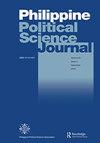被遮蔽的历史:EDSA之后的菲律宾劳工
Q3 Social Sciences
引用次数: 2
摘要
这场被称为EDSA革命或人民力量革命或EDSA人民力量起义的起义导致了菲律宾独裁者费迪南德·马科斯(Ferdinand Marcos)在1986年的垮台,据说它开启了被马科斯戒严令剥夺的公民自由的正式恢复。在起义之后,正式的民主机构和公民权利得到了恢复,包括自由选举的权利和和平集会的权利。但正如本文试图表明的那样,EDSA之后的政府已经被忽视工人的福利和未能解决诸如工资不足,工作不稳定和合同化等老劳工问题所损害。鉴于菲律宾就业机会的短缺,EDSA之后的政府也将移民作为其事实上的就业创造机制。但是,人力资源的输出并非没有丑陋的后果,例如使海外菲律宾工人(ofw)容易受到虐待和剥削。本文运用反历史的概念,利用来自政府和非政府组织的各种材料,对传说中的EDSA人民力量起义后的历史时期的劳动条件进行了批判性评估,并得出结论,没有发生明显的变化。本文章由计算机程序翻译,如有差异,请以英文原文为准。
Occluded Histories: Philippine Labor after EDSA
The uprising alternately called EDSA Revolution or People Power Revolution or EDSA People Power Revolt, which led to the downfall of Filipino dictator Ferdinand Marcos in 1986, supposedly ushered in the formal restoration of civil freedoms that had been snatched away by Marcos’ martial law. In the aftermath of the uprising, formal democratic institutions and civil rights were returned, including the right to free elections and the right to peaceful assembly. But as this article seeks to show, the administrations after EDSA have been marred by the neglect of workers’ welfare and the failure to address old labor concerns such as inadequate wages, job precarity, and contractualization. Given the shortage of employment opportunities in the Philippines, the administrations after EDSA have also promoted migration as its de facto job-generating mechanism. But the export of human resources is not without its ugly consequences, such as making overseas Filipino workers (OFWs) susceptible to abuse and exploitation. Deploying the notion of counter-history and using various materials from both government and non-government organizations, this article undertakes to critically assess the labor conditions during the historical period after the fabled EDSA People Power Revolt, and concludes that no notable changes have taken place.
求助全文
通过发布文献求助,成功后即可免费获取论文全文。
去求助
来源期刊

Philippine Political Science Journal
Social Sciences-Political Science and International Relations
CiteScore
1.00
自引率
0.00%
发文量
17
期刊介绍:
The Philippine Political Science Journal (PPSJ) is an internationally refereed journal and the official publication of the Philippine Political Science Association (PPSA). The PPSJ welcomes articles dealing with the politics and international relations of Southeast Asia. Manuscripts may focus on individual countries of the region but comparative articles about the countries in the region and the region as a whole are especially welcome.
 求助内容:
求助内容: 应助结果提醒方式:
应助结果提醒方式:


